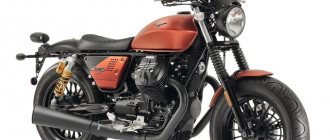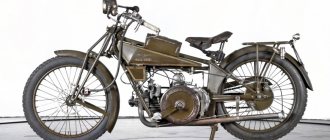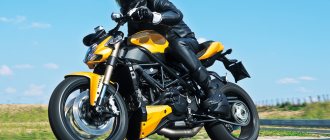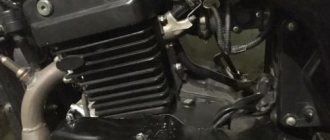I want to start this article by admitting that I already do this from time to time:
I have very mixed feelings about the looks of retro motorcycles. Simply put, I believe that anyone who pays a premium for a pair of ripped jeans or a T-shirt with fake sweat stains has more money than sense.
The same goes for pseudo-classic bikes. Some classic cars were excellent. Even today, I have yet to sit on a bike more exciting and satisfying than the Matchless G.50. And if I didn't have to sit in the saddle of another car other than the 1962 Triumph Trophy, I would still be happy. However, most classic bikes were junk in their day. They were unreliable, difficult to start, had unpredictable handling, and had no more power than a torpid hamster. Copying such motorcycles is as stupid as wearing a new artificially aged T-shirt.
MOTO GUZZI V7 II
I half-heartedly place the Moto Guzzi V7 II in the retro motorcycle segment, instead of calling it a parody of a classic bike. It is indeed a very nice modern unit in its own right, but it is also the heir to a 94-year history of motorcycle production on the shores of Lake Como in northern Italy.
Let's look at what makes a classic motorcycle better than a modern car, because on paper it should be inferior on all fronts. The key, overarching factor is that the motorcycle must have an emotional connection with the rider. This is what many retro bikes lack. Making a motorcycle more complicated does not mean making it better, it will just be more difficult, that’s all.
There's no point in arguing that if you have a 200 horsepower bike, you need traction control to get better tire grip. Less compelling, but still valid, arguments are made against having varied engine performance when traveling from areas with warm, dry roads into rainy conditions.
And yet, what electronics do is separate most pilots from the most important reason they get into the saddle - to feel the unique connection between man and two-wheeled metal horse. The best and brightest young designers understand this subtle, subtle idea. And when they produce a modern classic motorcycle, it retains the necessary connection to the original classic bike, but gains an electric starter and gets rid of the oil puddles on the garage floor.
So let's take a closer look at V7
Moto Guzzi V7 II
So let's take a closer look at the Moto Guzzi V7 II. To the casual observer, the transverse V-twin engine may look like the other Guzzi engines that have powered these cars since 1967. But things have advanced significantly over the past 48 years. Yes, the engine really lies, unlike the engines of modern mass-produced motorcycles, 90 degrees across the frame. And yes, it is air-cooled, but the concept is true to the 2015 manifesto and comes equipped with all the mandatory emissions control systems such as a catalytic converter and fuel injection.
Even though the Moto Guzzi V7 II is up to date, Moto Guzzi have done a great job as the catalytic converter is completely invisible and the rumble of the twin tailpipes suits the classic design perfectly.
In reality, things are even better. If you are interested, you can even drive around the monastery without disturbing the peace of the monks. Or, alternatively, you can have a lot of fun.
Turn the throttle of the Moto Guzzi V7 II harder and you will hear the pleasant growl of the 744 cm3 V-twin engine (bore and stroke: 80 mm 94 mm). It's not furious or overly quiet, but it's certainly easy on the ear, so you get the impression that the bureaucrats haven't stifled all the fun of riding a retro bike.
The Moto Guzzi V7 II engine is a beauty in itself, as efficient as it is beautiful to look at. It's one of those engines to be admired, and the casting and finishing are impeccable. The power the V7 produces can be deceiving. Obviously it needs to meet the requirements of the European A2 license, so it produces 48 horsepower at 6,500 rpm. Buyers in the US and Canada get two additional horses by reconfiguring the electronic control unit.
It may seem like there's no fun here, but Guzzi have somehow managed to ensure that peak torque arrives at an incredibly low 3,000 rpm. In practice, this means that the Moto Guzzi V7 II can be ridden like a moped or, God forbid, a cruiser.
Our test drive took us through the hills and the V7 proved to be a very practical touring car.
What the motorcycle lacks is high speed. I have no idea what its maximum limit is, but I would be very surprised if it is significantly higher than 170 km/h. Personally, during the test drive I saw the number 150 km/h on the speedometer several times. At these speeds, the V7's more brick-like aerodynamics require power that the bike simply doesn't have.
Motorcycle Moto Guzzi V 7 II Clubman Racer 2015 review
Description of the Moto Guzzi V 7 II Clubman Racer 2015 motorcycle is in the queue for publication of the article. Announcement: Today, for almost every new motorcycle that comes into being, marketers strive to carve out their own niche. This one is a road sport, this one is a recreational enduro. But what class should we include a motorcycle that has a little bit of everything? A good bike should have a reliable engine, comfortable ergonomics and simple controls...
Moto Guzzi V 7 II Clubman Racer is a motorcycle not sold in Russia, equipped with a high-power 48 hp engine. Despite the fact that good models of motorcycles have a very respectable price, and the season for their use is relatively short, the motorcycle market is developing rapidly. And if you believe the words of dealers, then some models of recently released motorcycles are selling like hot cakes at the beginning of the season, and the models brought to Russia are clearly not enough to fully satisfy consumer demand.
A motorcycle has long ceased to be an alternative to a car, and the times when this equipment was bought only because there was not enough money for a full-fledged car are forgotten. Nowadays, two-wheelers can be called technological marvels in many cases, and their cost can be compared with that of prestigious cars.
Many people have started buying motorcycles for hobby purposes as riding or even collecting them has become a good pastime for many people. Many motorcycles, for example the Moto Guzzi V 7 II Clubman Racer, whose technical characteristics make it possible to call the model a prestigious brand, are in demand among both beginners and experienced motorcyclists.
Motorcycles with an engine capacity of 744 cc / 45.4 in cu. see, appeared as a result of long work of inventors who sought to create a model that was not inferior in characteristics to other versions of the motorcycle. In some cases, these models are not only not inferior, but also ahead of other motorcycles, as they have minimal fuel consumption and other excellent parameters.
Motorcycles with an engine capacity of more than 400 kb. see, which includes the Moto Guzzi V 7 II Clubman Racer - this category of motorcycles simply cannot claim the title of “motorcycle for a beginner.” On the contrary, this is already a serious technique that requires certain control of motorcycle equipment with a smaller engine capacity. Yes, she attracts more attention, she is the most beautiful, fast, interesting and there is a huge selection of models. But as power increases, the weight of the motorcycle inevitably increases. In this class you are unlikely to find motorcycles lighter than 180 kg, unless they are the latest motorcycle models.
Go to the entire range of Moto Guzzi motorcycles, on this page you can find Moto Guzzi V 7 II Clubman Racer motorcycles from other years of production and information about them
The essence of Moto GUZZI V7 II
This is where the whole point of the V7 II lies. Driving above 145 km/h can result in your license being revoked, so the possible top speed is just a guess. I'm absolutely sure I could get a lot more out of the V7 and push beyond the legal limits with the 48 horsepower available.
However, more energy would not hurt, however, this always happens. After the test was completed, we whispered with the Guzzi staff, and one of them mentioned that the plant had a special version of the V7, which was just being tested somewhere in northern Italy. The engine produces 65 horsepower and torque has also been increased, so all requirements are met. Piaggio is now spending heavily on the Guzzi brand, including reworking the old Mandello del Lario factory, so the manufacturer sees a future in the retro motorcycle sector. The Super Moto Guzzi V7 II perfectly complements the standard V7 model. Let's see.
Let's get back to the present, to the box and clutch of the Moto Guzzi V7 II. In the good old days—they weren't really like that at all—shifting gears in a Guzzi was a lottery. Of course, it was possible to get the Guzzi gearbox to work correctly, but only if you were a sensitive pilot and a skilled craftsman. Today's six-speed V7, on the other hand, has an advanced gearbox that shifts smoothly and effortlessly. I never missed a gear, either downshifting or upshifting. I would not have been able to write this a few years ago. In the last five years, a six-speed gearbox on a bike like the V7 would have been suicidal, but in today's world that's not the case. Now the distance between gear ratios is ideal in all conditions, both in traffic jams and during high-speed driving.
The single-plate clutch is light and quick to engage, and the driveshaft is unnoticeable.
For 2015, the engine has been tilted forward 4 degrees and lowered 10mm. With this arrangement, the engine looks better, and there is also an additional 30 mm of space behind the heads and cylinders, which those with long legs will appreciate. With my height of 178 cm, I never felt that the engine was bothering me.
The seat has been lowered to 790mm. Ever since I raced and my knees suffered significantly from it, I can't stand a cramped driving position. And driving the V7 I had no problems in this regard. The back seat is also quite spacious.
Guzzi understands exactly what chassis is needed for the V7 II. Compared to the Aprilia superbike (Aprilia is Piaggio's other key brand), the Guzzi is basically raw and unfinished. The frame is steel, and there is nothing to even talk about adjusting the suspension. Only a cast pendulum meets today's technological developments. At the rear, you can see two legacy Bitubo shock absorbers.
Dual shock absorbers aside, there's nothing wrong with the chassis. All top classic bikes use steel frames and swingarms, and they will still outperform most modern super bikes. The sliders on the toes of my boots suggest that you can have a lot of fun if you want.
Guzzi hasn't released steering geometry data, but the pleasantly neutral handling suggests that the rudder angle isn't far from the magical 63 degrees, and the trail is 63.5mm. These parameters define the ideal classic motorcycle.
The brakes are also good, of course, not up to the level of super bikes. But when driving down a hill with a passenger on board, you feel that the front 320mm disc with Brembo calipers has plenty of grip and power.
“...I chose with my heart, not my head.” Moto Guzzi Nevada 750
Buying a bike is not as surprising as the prelude before the deal. Searching, choosing, talking on the topic with professionals or simply with owners of motorcycles of different classes is a pleasure more colorful than the most violent orgasm. Every novice motorcyclist was in a state of euphoria when choosing their first motorcycle. I'm not an exception. It’s easy to get lost in the countless number of motorcycles, especially for a girl. I ask standard questions when, after yet another monitoring of moto sales sites, I get hysterical. What are the criteria for making the right choice? What cubic capacity should I take for the first season? Which brand is better? It is possible that everyone is quite tired of me, but I would like to make up my mind and answer the most important question for myself - which is better to choose with your head or with your heart? Sell one or two kidneys to buy something you like?
My story begins with the words “...I fell in love with an Italian.” I fell in love not with the big DUCATI, but with a refined and modest girl – GIZZI (Moto Guzzi). Now another flurry of bewilderment should rain down on me, and the cold hand of reason will begin to strangle the voice of my song. I will remain silent and listen again: “Oh God, why!? What? Moto Guzzi Nevada 750 – why the hell do you want that?!! Learn to drive a small car. Buy “Ebrik”, “Sibikha” or Chinese, you will have enough for the first season. Moto Guzzi is expensive and impractical,” I’ll conclude and want two motorcycles. One for the mind (practice) and one for the heart (push). The heart belongs to the Moto Guzzi Nevada 750, the mind chooses for now.
I would like to tell you about the Moto Guzzi Nevada 750 not with the dry facts of mechanics, but with the story of a person. The owner of the motorcycle is called Georgy, and for each of the 20 thousand kilometers he manages to enjoy using one of the rarest bikes in Russia and the CIS. I met him by chance when I was looking for like-minded lovers of the brand.
His story begins with the words “...chose with his heart, not his head.”
— How did you get into motorcycle culture? — Like many people, I have been drawn to motorcycle culture since childhood. My parents always insisted that motorcycles were dangerous, so I skipped the “Java/Izh/Ural in childhood” stage. But the desire remained and only grew over time. Therefore, often going against the opinions of my relatives, I first bought a retro scooter. And only many years later the first motorcycle appeared in my garage. In my opinion, this is the best way to get to two wheels. Don’t rashly take a liter after receiving the category, but develop gradually and thoughtfully. I could sit for a long time and monitor sites, looking for something that could hook me, make me snap and go buy. So I first got a bright red Honda Giorno. It was 2009, I think my friend got the same Honda, but blue. Just at the beginning of the active promotion of the retro party to the masses. And then I had rare and not so rare scooters and mopeds: Yamaha Vino, Honda Benly, Vespa LXV50, Aprilia Mojito Custom 50. I still consider the latter the most favorite and convenient scooter for the city. The huge sofa alone, like on a full-fledged maxi-scooter, is worth it!
— What was your first motorcycle? How did you come up with this brand? — At a certain point, I realized that I didn’t want to stay in the 50cc class any longer, I started thinking about what my first motorcycle would be like. Like most of my friends, I liked choppers, and when I saw a custom Yamaha XVS 400 DragStar at a Japanese auction, I knew I wanted to be a chopper driver. Through a friend of mine, I placed a bet and after some time I was already sitting and counting down the days of the container’s arrival in Russia. At that time, I did not yet have a license, so another quest familiar to many lay ahead - obtaining category “A”. Leaving aside the first, vivid impressions of the motorcycle, I want to say that a custom from Japan is a controversial matter for me. Horribly painted, rusty in places, components assembled from different generations of motorcycles. In addition to the sound and appearance, it caused me complete disappointment. And after riding, I could not get used to the clumsiness and very hard seat. Therefore, after some time, the mot was put up for sale and sold, which I still don’t regret. — How did you come to the Moto Guzzi brand? Why Nevada 750? “This was the second motorcycle, so I started choosing from more practical and specific tasks. I wanted to travel, have reliable, unpretentious equipment, fast and maneuverable, and always on spokes. I have a general point about the spokes; without them, I don’t like a motorcycle. By that time, I had already begun to dive into the world of customization and saw that in Europe, in particular in a German studio like Kaffeemaschine, guys were building examples of classic cafe racers exclusively from one brand - Moto Guzzi. And I seemed to fall in love with this engine. I didn’t know why, I didn’t know how he behaved, whether he was reliable, after all. And again I chose with my heart, not my head. I went to see my current motorcycle 2 times and each time I returned empty-handed, it evoked too much opposite feelings. The third time, a seller who had not yet seen me came up to me and said that “there is a person here who is thinking of buying, he has already come 200 times. So you think rather, the bike is good, you might miss it.” To which I said that it was me and asked to draw up an agreement.
— What is the character of your motorcycle? - Insanely friendly. It forgives most mistakes, but does not make you feel like the “king of the road”: there is no ABS, ESP, traction, and in general, apart from the injector, there are probably no particularly complex electrics. This is an honest spendthrift and gives honest emotions. In the first season, or rather the last months of the 2016 season, I finally got my license and went to DOP. Every evening after work I went downstairs, started the motorcycle and drove to the center. I just went out and could drive until night. After a season with a “tail,” my impression of the Moto Guzzi Nevada 750 motorcycle changed and became warmer. But for the sake of objectivity, I will still highlight the “pros” and “cons” of my particular model. Pros: 1. Excellent traction, pulls from the very bottom up to almost 5 thousand rpm. 2. Very comfortable fit, combining the qualities of a cryuser and a classic. 3. Great handling at any speed. 4. Very reliable units, easy to maintain. 5. Cheap consumables. 6. Availability of engine components for repair. 7. Acceptable fuel consumption - 5-6 liters per 100 km Another advantage is the cardan. This is an essential attribute on long journeys. And now for the downsides: 1. There are no spare parts in stock, not to mention tuning. Everything has to be ordered and expected. 2. Very poor dealer network (the only representative whose work causes many complaints) 3. Rarity, and as a result, difficulty in selling on the secondary market. 4. Gearbox with 5 gears, you constantly try to put it in 6, but it’s not there. 5. Due to its low weight, the motorcycle may drift slightly in strong gusts of wind. Relatively small tank - 14 liters. It’s enough for the city, but a little further at a speed of 140-150 it’s not enough for long.
— How did you get your motorcycle? — My “Goose” has come a long way. From Italy to Japan, and from there into my hands. In Russia I am the first and only owner. — Why not another cruiser/sport? Simpler, cheaper, more widespread... - “Why Moto Guzzi?” A question I often hear) Probably, I just don’t like going where everyone has already gone. I can always buy something simple, and a limited number of people have such rare motorcycles, even in Moscow. Although, if you think about it, there is also Bimota, Moto Morini whose owners you will not find even during the day. I take my hat off to these people) - A question that may be funny. Why not DUCATI? — With all my love for the Italian motorcycle industry, poop will fly at me now, but DUCATI is “pop.” Go to Auto.ru, Dukas will already be in the 10 most popular positions. Then again, I'd like to have some kind of weekend DUCATI in the garage, maybe a HyperMotard or a liter Monster. Still, Italian design is a work of art. But if the clutch is open you will have to buy earplugs) Personally, this sound is like a knife to the heart.
— How do they treat your motorcycle in Russia? Do people turn around on the street? What do fellow motorcyclists say? — Attitudes towards Moto Guzzi are different, and it depends on the model. For example, my friend has a V7 with a yellow tank. And at the “review” people come up to his bike more often than to my gray Nevada. Well, it doesn’t look as impressive as the new “sevens”. Although, one evening, having arrived for another portion of sea buckthorn tea, I noticed a couple of old men near my motorcycle. As I got closer, I realized from their speech that they were Italians) They were surprised to see such a rare motorcycle even in their homeland. In parting, we wished smooth roads and went to catch up with the main part of our excursion group. At first my friends had to explain what kind of motorcycle it was, although those who had a DUCATI immediately understood what kind of animal it was. Basically, the motorcycle is of interest only to those who are already familiar with the brand. Mechanics are a plus, but I almost never go to them, there is no need, most components are easily serviced on their own.
— How do you generally receive greetings at motorcycle services? What about parts and consumables? Has it broken down seriously yet? Have you ever been in an accident? How did you two cope? — I’m used to servicing my motorcycle myself. Oils, filters, all this changes with the simplest tools available. Among the more serious works, I once replaced the bearings on both wheels, in the steering wheel, as well as the gas filter after a trip to Crimea. At the beginning of the year I went to St. Petersburg and it rained all the way there and back. Apparently, over the course of 13 years, all the lubricant was squeezed out of there back in that century, because when I arrived in Moscow I saw characteristic “rusty smudges.” My fuel pump fell out in Moscow, after 5,500 thousand on the route Moscow-Sochi-Sevastopol-Moscow Guslya “ate” a lot of different gasoline. It’s the same story with it - for 13 years, no one simply bothered to change it, so it simply burst from the amount of dirt inside.
— Is there an idea for tuning? Painting? — There were thoughts about tuning when purchasing. At that time I was suffering from “brain coffer racing” and this was the only way I saw my motorcycle. However, over time I realized that I would not raise my hand to slaughter such a rare animal and decided to leave everything as it was. I bought more from the aftermarket. I had to tinker with it: I found a rare glass, tinted, it was sent to me from Italy. Then I bought additional panniers, with color inserts from Germany. And to top it off, I bought a tank bag from a clubmate. As for possible tuning, I’m looking towards an LED headlight, but I’m not making up my mind yet.
— Aren't you afraid of theft? a rare beast) - No, I’m not afraid of theft. I have many acquaintances and friends in the motorcycle movement, and such a rare bike, if it disappears, will immediately resurface. And there’s no point in using it for spare parts either, because I know almost all potential buyers in Russia one way or another)
— Are you planning to change your motorcycle? Which one? - Yes, the motorcycle has been on sale since August) This, just returning to the conversation about the disadvantages of all rare motorcycles, and Moto Guzzi in particular is no exception - the fear of the average person. Everyone is afraid that if you buy a motorcycle, it will start to “make brains”, and it’s expensive to repair. And the crisis is taking its toll, the motorcycle is still not the latest, and on the Internet “armchair specialists” will find a huge number of new Chinese or almost new Japanese for the same money. A motorcycle for a connoisseur, that’s the kind of buyer I’m waiting for) And I was planning to change to a BMW, but I haven’t decided which one yet: either the R1200R or the R1200GS. It is very important for me that the motorcycle is reliable, powerful and comfortable for long trips, since I plan to travel to Europe for the season, and then to Karelia. And 750 is already not enough, I want a liter))
This is my story. If you want technical specifications, study the question as I do. Thank you. #motoguzzi #motoguzzinevada750
The Moto GUZZI V7 motorcycle looks complete and beautiful
And finally, and especially important in this market segment, the Moto Guzzi V7 motorcycle looks complete and beautiful. Someone took care of the thoughtful design, and Piaggio's accountants didn't spare a penny on production costs. There are sound financial motives for this policy. The V7 is one of Guzzi's most successful products and is loved by customers all over the world. It's not just a niche bike like the Honda CB1100EX, it's what makes Guzzi pay its bills and exist.
Customer focus is one of the main ideas of V7. But here I don’t entirely agree with Guzzi’s policy. The V7 has three versions, ranging from "Stone" to my personal favorite, "Racer". All motorcycles are mechanically identical. You should pay special attention to this. No matter what your V7 looks like, it will ride and handle like any other V7.
Personally, I didn't like Stone's matte paint. If you can't polish your vintage bike, what's the point? But Guzzi could cover a motorcycle with paint so deep and glossy that you would want to dive into it. That's why I choose the chrome Racer. I also like its lowered handlebar grips. The only problem was that the Racer only has one seat, meaning I wouldn't be able to take my photographer for a test drive. Guzzi representatives replied that for this version, a double seat must be ordered and paid for separately so that the dealer can install it before delivery, but the remaining single seat will have to be attached yourself to get back the money spent.
All Moto Guzzi options, be it exhaust pipes, seats or fuel tanks, fit any version of the V7 and do not require modifications or reconfiguration of the electronic control unit. Then the question arises: why can’t the buyer simply order a motorcycle in accordance with his wishes? This is hardly a new idea. The vast majority of new cars are built to order to meet a range of buyer requirements. Instead of simply choosing the color of the V7's fuel tank, car buyers decide on the engine, trim and other bells and whistles, or not, all depending on what their budget allows.
I can understand the economics behind selling accessories that are installed on the car after the sale. But I think it would be much better if Guzzi allowed them to customize the bike right off the assembly line. And if you want to install a clutch or brake lever made of titanium alloy, you can realize your dreams privately.
How does the V7 stack up against the competition?
This brings us to the main question: how does the V7 cope with the competition? Answer: incredibly good. I don't see anything attractive about Triumph Bonneville motorcycles. They are fat, boring and slow. It seems to me that together with them we should buy a subscription to the health center and go on a diet. To me, Bonneville bikes are more cruiser than retro. Royal Enfield Bullet motorcycles are not bad, but 29 horsepower can even cure insomnia. I once had a lawnmower with a two-stroke engine tuned so it made more power than the Bullet.
I really love the Ducati Scramble line. The bikes are stylish and the performance is incredibly good. The only problem is that they are too small for me, I can’t imagine spending a whole day driving such a motorcycle.
The best representative of classic and retro motorcycles is the Honda CB1100 EX, but it is much larger, heavier and faster than the usual cars for this class. If you exclude the Honda, the V7 is the star of the show and a bike I would definitely buy. Add in the 17 horsepower that Guzzi is currently working on and even Honda can't beat this agile and extremely enjoyable bike.










